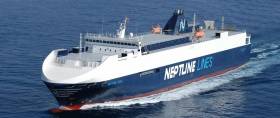Displaying items by tag: Greek chartered PCTC
Greek Charter Draws to A Close on P&O Dublin-Liverpool Service
#GreekCharter - The charter of a Greek vessel to P&O Ferries to cover dry-docking of the one of three ropax ships on the Dublin-Liverpool is drawing to a close, writes Jehan Ashmore.
Piraeus based Neptune Lines, a vehicle logistics operator have their Neptune Aegli operating in place of P&O’s European Endeavour which is at Cammell Laird, Birkenhead for annual overhaul.
The Spanish built European Endeavour is scheduled to re-enter service tomorrow with an arrival to Dublin in the morning. It is expected the 366 passenger / 112 lorry ropax will appear with a modified version of the traditional P&O livery scheme already introduced on the route's Dutch built sisters, Norbank and Norbay. The pair are also ropax's having been built originally for North Sea service.
While the ‘European’ is away, the 1,550 freight vehicle lane metre capacity Neptune Aegli presented a sleek looking profile. The ship built in 2002 is not a ropax but is designated a Pure Car & Truck Carries (PCTC) which can transport 1,800 car units. Neptune Lines has operations in 20 countries and more than 30 key ports, focusing on the Mediterranean and Black Sea.





























































